The 10 Biggest Product And Services Enhancements From Google I/O 2018
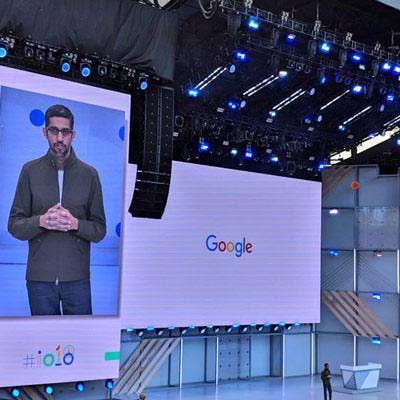
The Latest And Greatest
Google CEO Sundar Pichai, along with several other Google executives, took to the stage this week at Google I/O 2018, the company's annual developer conference. Google shared a plethora of exciting new advancements and, specifically, how artificial intelligence was bettering many of its existing products and services.
It's no surprise that Android P, now available in public beta, was highlighted, but many other applications took center stage too, including an updated Maps and News app. Google Assist is getting a big boost from AI, wowing the audience of more than 7,000 with its new voices, conversation capabilities, and even the ability to place calls on behalf of a user.
Here's a roundup of the biggest products and services enhancements that were unveiled this week at Google I/O.
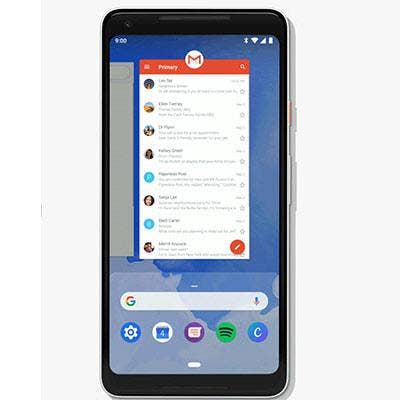
Smarter Android P
Android P will be Android's smartest OS yet, with four new AI-based features. Specifically, Android P will also be using AI to adjust to user behavior and environment with no manual adjustments necessary.
Adaptive Battery, a new feature, uses machine learning to adapt to application usage patterns to reduce CPU app "wake-ups." The OS will also feature an Adaptive Brightness setting that can adjust a device's brightness based on user preferences or room or outdoor settings. App Actions will be able to predict which app tasks as user will need, based on time of day or circumstance, and can suggest actions, such as a workout. Along a similar vein, App Slices is an API that will let developers put parts of their app into various portions of the OS, such as search. Users that search for Uber, for example, will see how long a ride will take to a typical location, like home, an estimated cost of the ride, and can prompt a user to order a ride right from search.
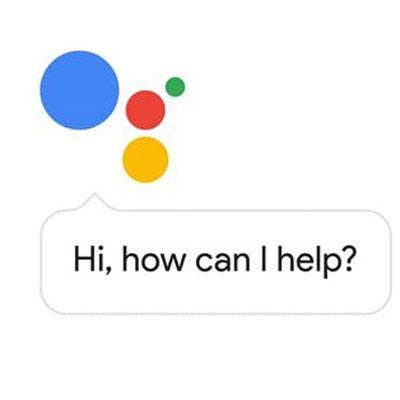
Continued Conversation
Google wants to make Google Assistant, its personal assistant technology, more naturally conversational. Using AI, Google Assistant will start to be able to understand the social dynamics of back-and-forth conversation.
Google said that it users won't have to say "Hey, Google," every time they'd like to convey a request. Google Assist will also be able to understand if a user is talking to the technology or not and pick up the right requests. In addition, users will be able to make more than one request at the same time. This new feature, Continued Conversation, will be available later this year.
New Voices
Speaking of making Google Assistant more naturally conversational, Google revealed that it will offer six new voices in addition to the current default voice, known as "Holly." Most notably, John Legend is one that is lending his vocals as one of the next Assistant voices that users can select.
Pretty Please
Google Assist will also be gaining a family-friendly twist. The company shared that some have been asking whether children asking Google for a request could be teaching children to be bossy or demanding, so the company is working on a new feature that will be released later this year called Pretty Please. The feature requires users to say "please" while making a request, and Assistant can either remind the user for the magic word, or acknowledge and thank the user for the polite behavior.
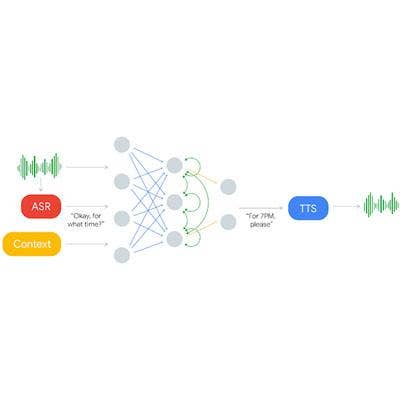
Google Duplex
As Google Assistant becomes more natural, the technology soon will be able to go a step further and make phone calls -- like booking appointments or making reservations -- on behalf of a user with a very natural-sounding voice.
Using natural language processing technology, the new feature, Google Duplex, can even handle complex interactions or back-and-forth conversations with answers that may not be anticipated. The feature will be especially useful in helping users to contact local, small businesses that may not have automated answering or booking systems.
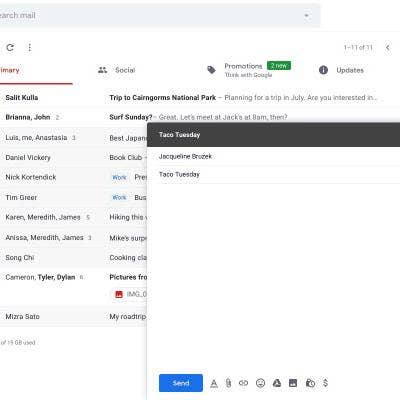
Gmail Smart Compose
Gmail wasn't exempt from the AI bonanza at Google I/O. The popular email platform is also being injected with AI. The company revealed Smart Compose, a feature that will literally help users finish their sentences when composing or answering emails using machine learning. The feature will be able to add entire chunks of sentences as a user begins to type based on the topic of conversation. The feature is designed to learn from the user and become smarter over time.
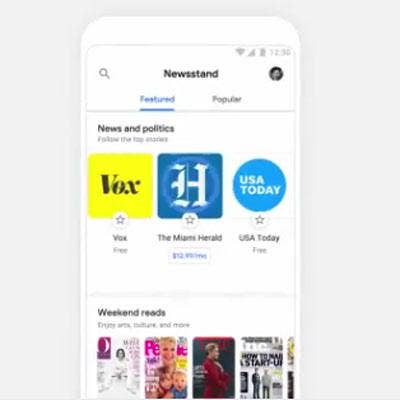
Full Coverage From Google News
News has never been more critical, and Google wants to make sure users have access to the stories they care about from trusted, viable sources.
To that end, the company unveiled the new Google News app, which will be rolling out across 27 countries next week. The app will include a Full Coverage feature that invites users to learn more about a topic by giving a bigger picture of how the same story is being reported by a variety of other unfiltered, reliable sources. The updated app will open with a briefing of the top five news stories, as well as a personalized briefing for each user with both global and local content that improves and becomes more targeted each time it's used.
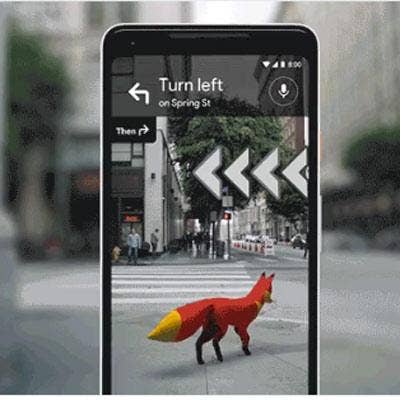
Google Maps
Google delighted the crowd of 7,000 during its opening keynote Tuesday when it demonstrated its newest feature coming to Google Maps that will solve one of the biggest user gripes -- not knowing which direction to start moving toward. Google Maps is being integrating with Google Lens so users can point their phones at the street and a StreetView overlay will pop up, pointing the user in the right direction. The maps layout will remain at the bottom of the screen for reference. Google did not give a release date for this update, however.
Google Maps is also being bolstered by machine learning. The app will now include a "For You" tab that will offer a rundown of new places and personal recommendations for users on places such as new restaurants to try.
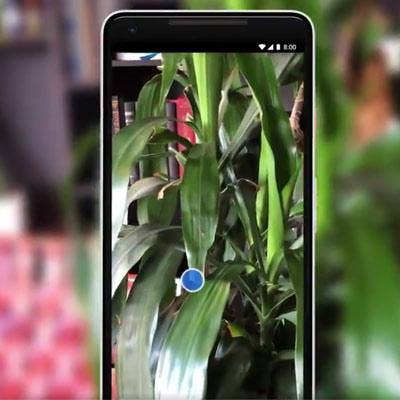
Google Lens
Maps isn't the only way Google Lens will be able to help users. Google Lens, which was first announced during last year's developer conference, is being integrated into Android's camera, which will allow Lens to assist users in real time on new applications, like identifying objects or translating text.
In a new application called Style Match, Google Lens can be used to recognize clothing and furniture styles to show users similar products for different prices by other manufacturers. Google Lens can also parse text to translate a street sign or menu in a foreign language into the user's native language.
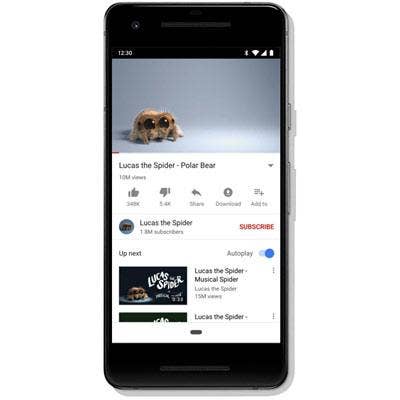
Digital Wellbeing
Among all the exciting updates and product enhancements, a big theme that stood out during Google's opening keynotes was wellness.
To that end, Google rolled out a series of updates it is calling Digital Wellbeing. The new features include the ability for users to automatically put their phone in Do Not Disturb mode when flipping the phone over so that notifications don't cause any distractions -- a capability called "Shush." The new Android dashboard can also track how long users have spent on their phone that day, and gives users the choice to set time limits on specific applications. "Wind Down," another wellness feature, will set users' phones to a less stimulating grayscale around a set bedtime to encourage users to log off.